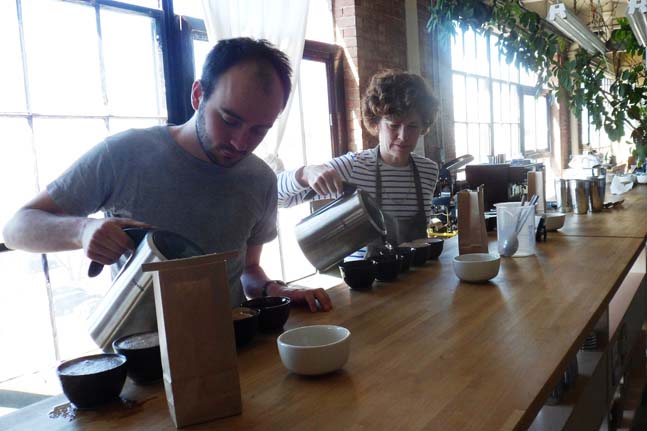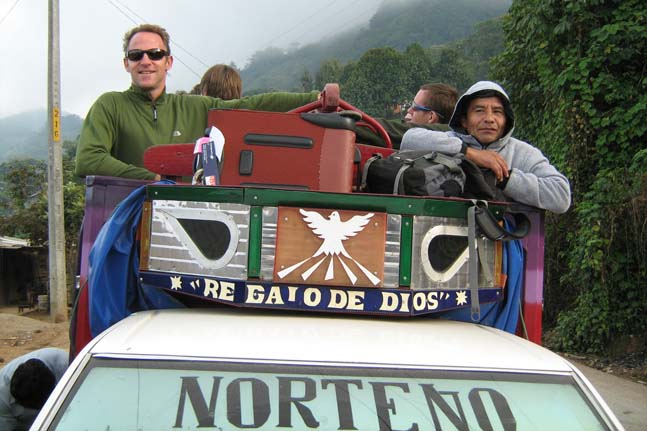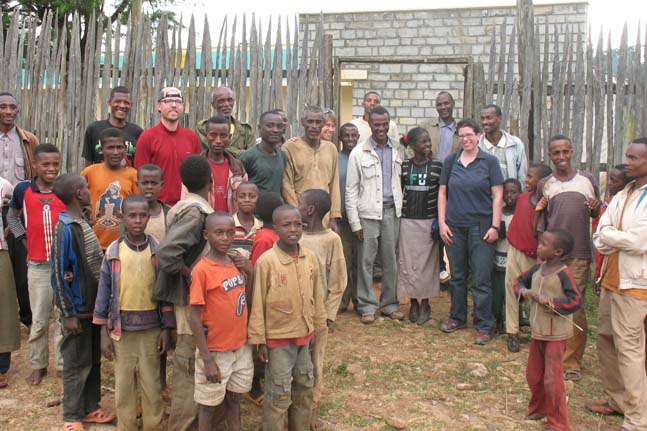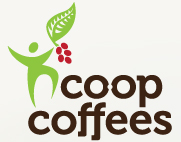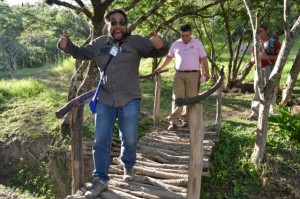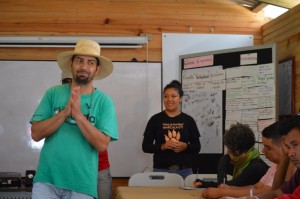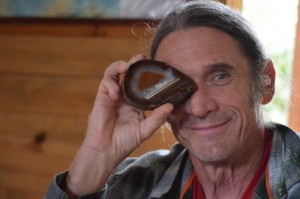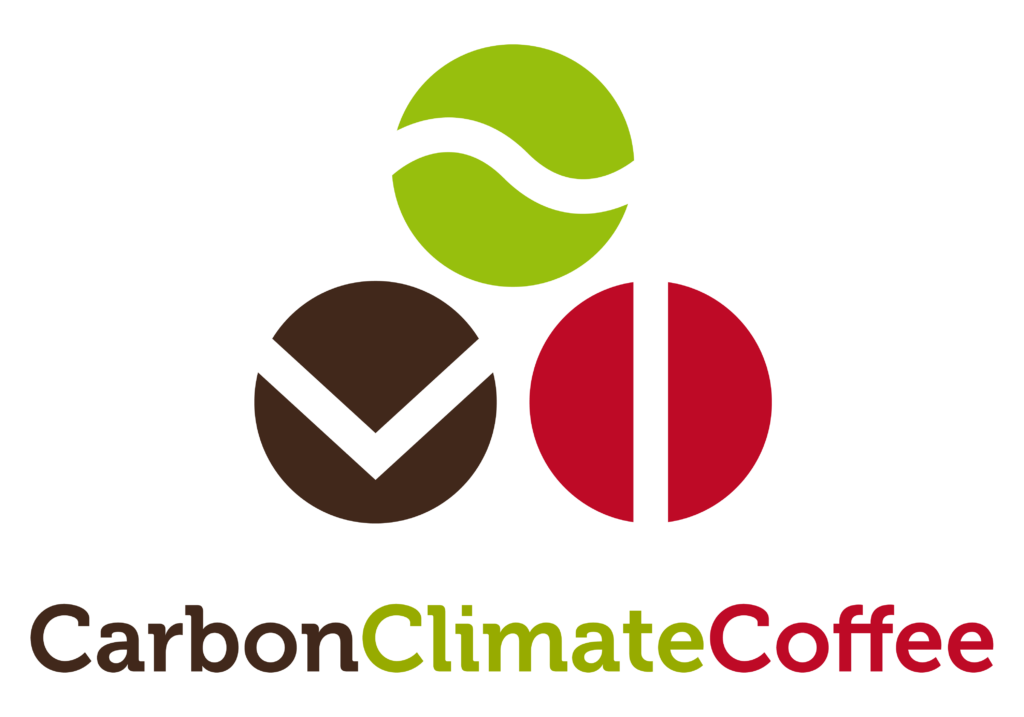
El Diplomado Organico provides the ideal context for learning and exchange
What a delight to coordinate with the COMSA team and our Latin American producer partners to pull this week-long, learning event together! While CoopCoffees covered the on-site costs, it was COMSA who worked the real magic: developing curriculum, organizing the logistics for both the demo/workshops on their training farm La Fortaleza and the producer site visits, while maintaining the dynamic and interactive energy within our diverse group of 28 producer, roaster and researcher participants.
Each one of the interested participants was responsible for getting him or herself to Honduras. Exemplifying their enthusiasm to learn about the innovative practices, we had producers flying in from as far as Peru, and the brigade from Mexico and Guatemala “carpooling” together in order to take part! But as you can see, far from any of this generating fatigue or frustration – the group was impressively cohesive, collaborative and a fun-loving throughout the event.
COMSA set the context of the meeting with a round of introductions and expectations from each of us, which would be revisited at the end of the week, in order to gauge to what extent the workshop organizers and participants met collective and our own, individual expectations (which we did return to at the end of the event – with stellar results!).
“When we began this journey 15 years ago, we thought organic agriculture simply meant that we needed to eliminate chemicals from our production systems,” said COMSA Tecnico Fredy Zelaya. “But along the way, we learned that true organic agriculture means so much more, and it begins in our brain.“
“We are each a divine being; we are emotional, spiritual, energetic, physical and mineral beings,” he added. And we’re connected to our world through our five senses.”
We called upon each of those senses throughout the week, as we walked, talked, tasted, smelled, touched and listened — moving from one topic to the next.
The Diplomado Organico was an incredible blend of: big picture understanding of regenerative production systems and sustainable community development; learning new recipes and applications of specific organic composting systems and foliar sprays, as well as biodynamic agriculture and mineral energy; farm visits and diversification; and a good dose of alternative education and cultivating a spirit of innovation. OR in COMSA terms: a Crash Course of the 5M’s (materia organic; micro-organismos; minerals, moleculas vivas y material gris).
COMSA has learned a lot since their founding in 2001, and continues to evolve with an increasingly holistic approach to production and community development. But the transition has not always been smooth… and many founding members dropped out in the early stages.
With support from the Corporación Educativa para el Desarrollo Costarricense (CEDECO), the tecnicos and producer leaders at COMSA learned new and innovative practices: promoting integrated soil health and water conservation, and an integrated approach to the preservation of local plants and biodiversity. Meanwhile, members began to see improvements in coffee yields, better family relationships and, in turn, steep growth in membership with coffee farmers joining COMSA from regions in and around Marcala.
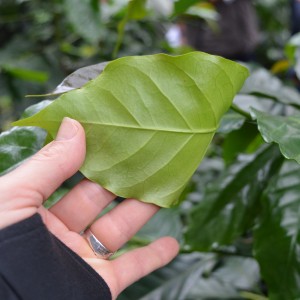 Today, COMSA is 1200 members strong and with a waiting list of producers still hoping to join the organization. Their lead farmers continue to demonstrate effective, regenerative organic practices that are bot improving productivity and protecting their plants from common diseases – as we see from this pristine coffee leaf (at right).
Today, COMSA is 1200 members strong and with a waiting list of producers still hoping to join the organization. Their lead farmers continue to demonstrate effective, regenerative organic practices that are bot improving productivity and protecting their plants from common diseases – as we see from this pristine coffee leaf (at right).
“We were beginning to understand that before we could expect improvements in production, we would need to recover the life in our soils that we’d been killing all those years with chemical-production poisons,” Fredy added. “That’s when we began experimenting with micro-organisms.”
With their initial successes, members became more and more open to experimentation with innovative organic practices, and the following “organic evolution” transpired: 2001 – use of organic materials; 2006 – application of micro-organisms in compost; 2010 – exploring the use of minerals; 2012 – production of fermented “moleculas vivas”; 2013 – strengthening the grey matter (brainpower) of their technical team and members, and implementing an alternative and empowering educational program with their youth and women’s groups.
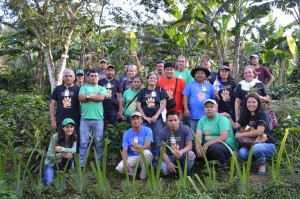 Throughout the week the operative phrase was “Con Miados y Mierda… no hay cosecha que se PIERDA!” (the poetic-license translation: “With piss and poop your harvest won’t droop!)”.
Throughout the week the operative phrase was “Con Miados y Mierda… no hay cosecha que se PIERDA!” (the poetic-license translation: “With piss and poop your harvest won’t droop!)”.
Check back in the next week or so, and you’ll see how far we took that sentiment!
Author: Monika Firl
December 16, 2016


